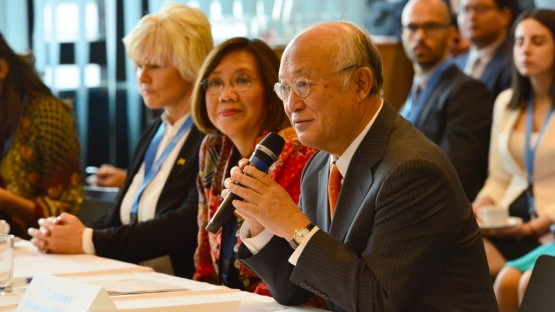Women play an increasingly important role in the nuclear field as scientists, engineers and managers, but there is still a long way to go to achieve equal representation. Panellists discussed this challenge and possible solutions at the IAEA’s fourth ‘Women in All Things Nuclear’ event, held on 27 September in the margins of the 60th General Conference.
“Women make an enormous contribution to the work of the IAEA at all levels,” said IAEA Director General Yukiya Amano. “Having a well-balanced, diverse workforce contributes greatly to the success of our programmes.”
Ambassadors, Member State representatives and senior IAEA officials took a closer look at the evolution of women’s contributions in the nuclear field over the past 60 years and discussed the challenges they face. Laura Rockwood, Executive Director of the Vienna Center for Disarmament and Non-Proliferation, moderated the panel discussion.
Practical Ideas for Change
“We can start changing things now,” said Laura Holgate, the United States Representative to the Vienna Office of the United Nations and the IAEA. She encouraged the use of a practice called ‘amplification’, where women in meetings acknowledge the contributions of their female colleagues and credit them with their ideas. She also proposed that Ambassadors and other sought-after speakers commit to asking panel organizers about the number of women speaking and the steps taken to ensure gender balance at their events.
“We can form habits and build on the thinking already established to break the gender imbalance in the UN, in diplomatic missions and in private groups. We need to pool our efforts and work together,” she said.
Education
Panellists agreed that education can help develop a strong generation of female leaders in science, technology, engineering and mathematics (STEM). “The only way we have to move forward is through education,” said Ambassador of Mexico Alicia Buenrostro Massieu. “Education is the most transformational tool we have in our hands to promote science and technology among women.”
Maria Zeneida Angara Collinson, Permanent Representative of the Philippines to the United Nations and other international organizations in Vienna, cited the example of a recent IAEA pilot project in Asia. The compendium, which was piloted by the IAEA and education experts from several countries, collects unique teaching strategies and materials to introduce science and technology in education systems. Learn more here.
“From the scientific to the technical and to the humanitarian, there are opportunities for women to develop well-rounded and fulfilling careers in what is a growing sector,” said Juan Carlos Lentijo, IAEA Deputy Director General and Head of the Department of Nuclear Safety and Security. He also spoke about his experience in recruiting women both at the IAEA and in other organizations in the field. “We have to work on ensuring that the exceptional talent in young women and girls is nurtured by decision makers in the IAEA and the nuclear industry.”
Leadership
Women in leadership positions have a special role to play, said Bente Angell-Hansen, Ambassador of Norway to Austria and Head of the Norwegian Mission to the United Nations in Vienna. “They have to deliver quality in leadership and build trust and transparency. These values, which are based on respect and dignity, must be reflected in all levels of an organization.”
Kim Rudd, Parliamentary Secretary to the Minister of Natural Resources of Canada, talked about how Canada has formed the first cabinet composed equally of men and women. “Now we need women leaders more than ever,” she said. “We won’t meet the test of our times —climate change and introducing a low carbon economy— if we sideline half of our global brainpower”.
Janice Dunn Lee, IAEA Deputy Director General and Head of the Department of Management, summed up the discussion, calling it inspirational and motivating. “We have suggestions to think about for the future to make sure women’s talents are recognized in the nuclear community.”
The annual event was the fourth of its kind co-organized by the IAEA and the Vienna Center for Disarmament and Non-Proliferation, and was co-sponsored this year by the Permanent Mission of the United Arab Emirates to the IAEA.







